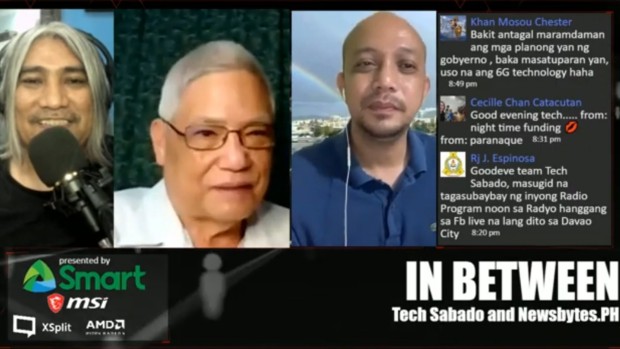Eliseo M. Rio Jr., former acting secretary and undersecretary of the Department of Information and Communications Technology (DICT), shared the high points of his decades-long career in the government during the second episode of new podcast IN BETWEEN presented by Tech Sabado and Newsbytes.PH.
In particular, Rio recalled his role during the popular uprising, dubbed “Edsa Dos”, that toppled former president Joseph “Erap” Estrada in 2001. Although he had already retired from the Armed Forces of the Philippines (AFP) in October 2000, Rio revealed that he was part of the military group that orchestrated “text blasting” to foment dissent in public to force Estrada out of power. At that time, he said the military was split into two factions — those loyal to Estrada and those who backed Gloria Macapagal-Arroyo.
He said he even remembers former police chief and now senator Panfilo “Ping” Lacson, who was closely associated with Estrada, as a tough adversary in the propaganda battle because of his intelligence background. “I can disclose these things now because it’s already in the past and it can no longer affect anybody anymore,” he said during the podcast, which was livestreamed on Facebook Live and YouTube.
Rio said his role in “Edsa Dos” allowed him to land a stint as commissioner of the National Telecommunications Commission when Macapagal-Arroyo ascended the presidency. One of his first official acts in his NTC term was the extension of the Provisional Authority (PA) of Globe Telecom and Smart Communications.
At the time, he recalled that all telecommunication, broadcasting, and cable TV entities were issued one-year PAs by the NTC. This was considered a large hurdle for organizations who needed to borrow money from financial institutions, he said.
For example, in Globe ’s application for a Certificate of Public Convenience and Necessity (CPCN), the NTC issued a PA for 18 months on 1998, then an extension for another 36 months until 2002. Eventually, the company was granted a permanent license.
“When I entered NTC, Globe and Smart had around six million subscribers between them. When I left NTC in 2005, it reached more than 20 million. We also became the texting capital of the world,” he said.
Rio also mentioned how he brought in Digital Telecommunications Philippines (Digitel) into the country as the third-largest mobile telecommunications company before it was acquired by PLDT in 2011.
During his younger days, Rio placed fourth in the very first Electronics Engineer (ECE) Licensure Examination in the country after graduating with an ECE degree from the University of the East. He then began working for the AFP Research and Development Center and headed the electronics division of late President Marcos’ Project Santa Barbara.
He was later appointed as assistant chief of staff for Communication, Electronics and Information System of the Philippine Army from 1995 to 1998, and became the Deputy Chief of staff for Communications, Electronics and Information Systems for the AFP, before retiring from the military in the year 2000.
Upon seeing how much the country lacked the required ICT infrastructure, one of Rio’s first priorities as acting DICT secretary in 2018 was to push through with the international submarine cable project with Facebook.
“The bandwidth that Facebook will provide was supposed to arrive before the second quarter of this year. But there was a delay because outgoing US president Donald Trump prevented Facebook from connecting directly with Hong Kong,” he said.
The Pacific Light Cable Network, which is expected to lower the cost of Internet services in the country by a significant amount, will also provide the country with an annual internet capacity of two terabits per second in exchange for using the Luzon Bypass Infrastructure.
“It will be distributed to all government offices down to barangay level. All 42,000 of them, even barangay offices, will all be connected through the Internet. Right now, we are paying more than a billion pesos for Internet connectivity, and not everyone is connected,” he replied when asked about the free bandwidth that will power the national broadband plan.
Rio also shared an advocacy group he is currently a part of that promotes community Wi-Fi access across the country. In fact, he hinted that this new connectivity distribution model that the group came up with for remote areas and small-scale businesses may hold its pilot launch around February this year.
“During the pandemic, we noticed two things – the number one commodity now is Internet connectivity … and we have about a million sari-sari stores in the country. If we can put WiFi hotspots in these stores and invest on routers, they can have their neighbors access it,” he said.
By the end of the interview, Rio remarked at how technology has evolved through the years. From the heyday of computers that used vacuum tubes for logic circuitry and now where technology can fit in the palm of one’s hands, the purpose remains the same.




